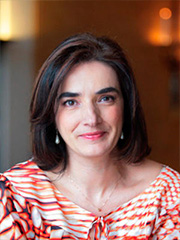Elvira Fortunato appointed to new group of scientific advisors at the European Commission

The European Commission today launched its new Scientific Advice Mechanism (SAM) with the announcement of the composition of the first High Level Group of scientific advisors to the European Commissioner for Research, Science and Innovation, Carlos Moedas. Among the seven advisors is Elvira Fortunato, Director of CENIMAT and i3N, Full Professor and member of the Scientific Council of the Faculty of Science and Technology, New University of Lisbon (FCT-NOVA).
Elvira Fortunato paved the way for transparent electronics in Europe by demonstrating that oxide materials behave like true semiconductors and by creating thin-layer transistors based on oxide semiconductors. In 2008 he received an Advanced Grant, the first Call from the European Research Council (ERC). That year, with his colleagues, he built the first paper transistor, launching a whole new field - paper electronics.
Her work has been internationally recognized through numerous scientific and civil awards, such as the decoration with the Grande Ordem do Infante D. Henrique (by the President of the Republic, in 2010). Elvira Fortunato was a member of the National Council for Science and Technology (CNCT) and also a member of the advisory board of DG CONNECT.
The High Level Group of scientific advisors supports the development of European policies or legislation by the European Commission with high-quality, timely, independent and best evidence-based scientific advice. The advisors also have the mission to support the Commission in identifying public policies in need of independent scientific advice.
The members of the High Level Group, selected following a call for nominations and based on the recommendation of an independent identification committee, are:
- Janusz M. Bujnicki(Laboratory of Bioinformatics and Protein Engineering, International Institute of Molecular and Cell Biology, Warsaw)
- Pearl Dykstra (Professor of Sociology, Erasmus UniversityRotterdam)
- Elvira Fortunato (Department of Materials Sciences, Faculty of Sciences and Technology, New University of Lisbon)
- Rolf-Dieter Heuer (Director General, European Organization for Nuclear Research (CERN))
- Julia Slingo (Chief Scientist Met Office, Exeter)
- Cédric Villani (Henri Poincaré InstituteParis)
- Henrik C. Wegener (Technical University of Denmark)
The Commission's SAM mechanism includes funding of €6 million to support collaborations between European scientific societies and academies for scientific advice to public policy. According to the Commission, this funding and the High Level Group mark "a new approach to independent scientific advice in the public policy building process by the European Commission."